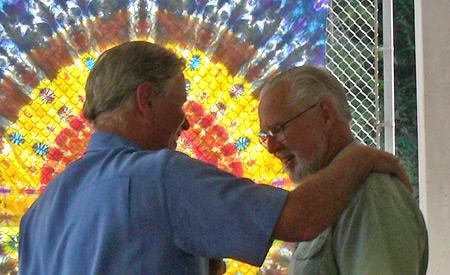A Canadian dotcom millionaire named Stewart Butterfield is featured on the cover of this month’s Forbes magazine. Butterfield is responsible for creating the photo-sharing start-up Flickr, which was bought by Yahoo in 2005.
But Butterfield did not get the name Stewart until after his 12th birthday, when it was legally changed after he and his parents moved to Victoria. His parents, David and Norma, were back-to-the-landers who came to Lund, BC in search of a different life and to dodge the United States’ Vietnam draft—hippies, by any other name. They called their son Dharma and he was one of many babies delivered at home in the community around that time. That was 1973.
David and Norma are now prosperous developers, creating innovative villages and towns.
A reunion took place in Lund during the recent BC Day long weekend. It was a gathering of almost 200 former dropouts, rebels, and back-to-the-landers who came from far and wide. Among them, an actor from London, England, a college instructor from San Diego, a history of science professor, a physician’s assistant from New York City, a three-time mayor from California and a biologist from Hawaii.
“The reunion brought up strong feelings and old memories,” said Peter Behr, one of the local participants. “It was surprising how many of us ex-hippies have made extraordinary contributions to our fields and to the progress of humanity.”
The gathering also included social workers, teachers, health-care workers, lawyers and a variety of other professionals, as well as a woman who once lived on a commune in Galley Bay and led a successful fight to legalize midwifery in British Columbia.
“When the hippies dropped back into society they did so with a commitment to achievement and positive social change,” said Behr. “I am very proud of these contributions.”
The gathering at the former Lund School on August 2 began with time for reconnecting with old friends, hugging, laughter and tears. Many hippies had left their families to move to Lund, and their young, idealistic friends there became their new families. Relationships were deep and abiding, said Behr. Acknowledgment was made of the kindness, tolerance and help of the older Lund residents who, somewhat bemusedly, welcomed these colourful new residents into their community.
Most of the people who came to the reunion lived near Lund or south of town in the 1970s and survived in homemade cabins with wood heat, organic gardens and dreams of creating an alternate culture. They formed food co-ops, a crisis centre, recycling depots, summer camps, musical groups and a theatre troupe, and often survived on the small government grants of the Pierre Trudeau era.
Photographs of local residents from the 1970s were mounted at the reunion on the school walls, showing hairier versions of the now-greying participants. People met amidst vivid, tie-dyed hangings, exclaimed over the old photographs and paintings and took photos.
Throughout the weekend people were filmed and interviewed by Lund filmmaker Tai Uhlmann and her team for the upcoming documentary, The End of the Road, about the Lund hippie generation.
Before dinner, people gathered in the old, sunlit schoolyard in a huge circle to share an hour of three-minute presentations. Topics included the US political refugee journey, building a wooden dome house, the home-birth movement and the loss of loved ones, including the recitation of a long list of those who have died. A moving story was told about a recent home death and the dedicated support for the family by the Lund and Powell River communities.
Long, flower-decorated tables stretched over the courtyard. There, the reunion continued with more socializing over a fine meal catered by chef David Bowes, accompanied by salads and desserts in the finest Lund potluck tradition.
The evening ended with a dance at the Lund Gazebo that went on until the early hours of the morning. At dusk, a small drone camera flew over the grounds to film the crowd gathered there.
“Those hippie dreams of creating an alternate culture have survived and continue to blossom today,” said Behr, “moving from Lund on out into the greater world.”



